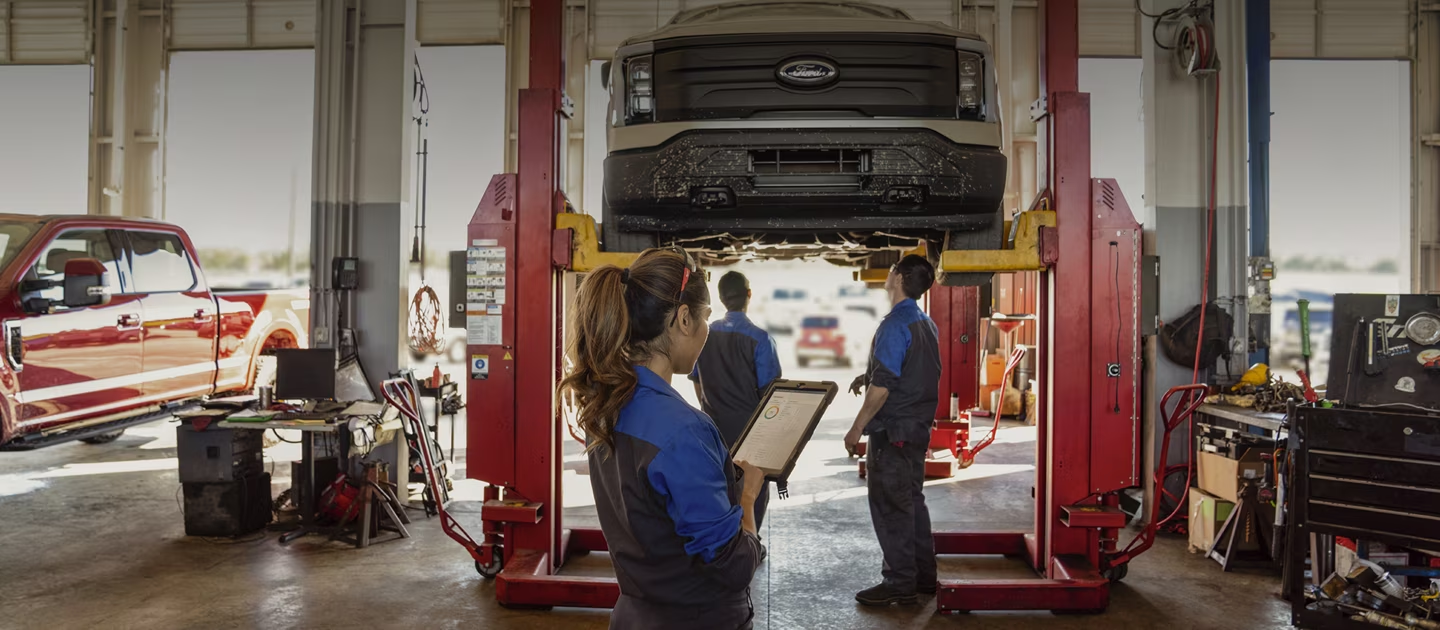Guide to Diesel Engine Repair Maintenance at a Ford Dealership
Ford Dealership Maintenance: Diesel engine pumps are crucial in various industries, from agriculture to construction. These powerful machines transfer fuel from the storage tank to the engine, ensuring smooth and efficient operation. However, like any mechanical equipment, diesel engine pumps require regular maintenance to sustain their optimal performance. This comprehensive guide will walk you through … Continued

Ford Dealership Maintenance:
Diesel engine pumps are crucial in various industries, from agriculture to construction. These powerful machines transfer fuel from the storage tank to the engine, ensuring smooth and efficient operation. However, like any mechanical equipment, diesel engine pumps require regular maintenance to sustain their optimal performance. This comprehensive guide will walk you through the essential steps and best practices for diesel engine repair of your engine pump, ensuring its longevity and efficiency.
Importance Of Regular Maintenance For Diesel Engine Pumps
Regular diesel engine repair at a dealership is essential for diesel engine pumps to function at their best. Neglecting maintenance can lead to various issues, such as decreased fuel efficiency, loss of power, and even complete pump failure. By implementing a proactive maintenance routine, you can prevent costly repairs and downtime while also extending the lifespan of your diesel engine pump. Additionally, regular maintenance helps identify potential problems early on, allowing for timely repairs and minimizing the risk of more severe damage.
Signs Of A Malfunctioning Diesel Engine Pump
Awareness of the signs of a malfunctioning diesel engine pump is crucial to prevent further damage and address issues promptly. Some common indicators of pump problems include:
- Decreased fuel efficiency: If you notice a sudden drop in fuel efficiency or increased fuel consumption, it could be a sign of a malfunctioning pump. A poorly functioning pump may not deliver fuel consistently, causing the engine to work harder and burn more fuel.
- Loss of power: A faulty diesel engine pump can result in a loss of power, leading to decreased performance and reduced productivity. If you notice a lack of power or difficulty reaching maximum speed, inspecting the pump for any issues is essential.
- Unusual noises: Unusual noises, such as grinding, squealing, or rattling, can indicate a problem with the pump. These noises may be from worn-out bearings, damaged impellers, or other internal components that require attention.
- Fuel leaks: You should immediately address any visible leaks around the pump or fuel lines. Fuel leaks not only waste precious fuel but also pose a safety hazard.
Diesel Engine Repair Maintenance Checklist
Following a comprehensive maintenance checklist is important to keep your diesel engine pump in top condition. Here are the essential steps to include in your routine:
- Regular inspections: Conduct regular visual inspections of the pump and its components, checking for signs of wear, leaks, or damage. Pay attention to the fuel lines, connections, and seals.
- Clean fuel filters: Clean or replace fuel filters at regular intervals to prevent clogging and ensure a steady flow of clean fuel to the engine.
- Check fuel quality: Monitor the fuel quality used, as contaminated or poor-quality fuel can damage the pump. Ensure you use the recommended fuel type and follow proper storage guidelines.
- Inspect belts and pulleys: Check the condition of belts and pulleys, ensuring they are properly aligned and tensioned. Replace any worn-out or damaged components promptly.
- Monitor fluid levels: Regularly check the fluid levels, including engine oil, coolant, and hydraulic fluid. Low levels can cause overheating and damage to the pump.
- Inspect electrical connections: Inspect all electrical connections and wiring for signs of damage or corrosion. Loose connections can lead to poor pump performance or even electrical failure.
- Follow dealership or manufacturer’s maintenance schedule: Consult the manufacturer’s maintenance schedule and follow the recommended intervals for specific tasks, such as changing filters, replacing fluids, or inspecting critical components.
Steps For Cleaning And Inspecting A Diesel Pump
Cleaning and inspecting your diesel engine pump regularly is crucial for optimal performance. Follow these steps for a thorough cleaning and inspection process:
- Prepare the pump: Ensure the engine is switched off and cool before starting the cleaning process. Disconnect the pump from the power source and remove any access panels or covers that provide access to the internal components.
- Clean the exterior: Use a soft brush or cloth to remove dirt, debris, or grease from the pump’s exterior surfaces. Pay attention to vents, cooling fins, and other areas that may accumulate dirt.
- Inspect for leaks: Check for any visible fuel or fluid leaks around the pump or fuel lines. If leaks are detected, identify the source and address the issue promptly.
- Inspect and clean fuel filters: Remove the fuel filters and inspect them for signs of clogging or damage. Clean or replace the filters as necessary to ensure proper fuel flow to the engine.
- Inspect belts and pulleys: Check the condition of belts and pulleys, ensuring they are properly aligned and tensioned. Look for signs of wear, cracks, or damage. Replace any worn-out components.
- Inspect electrical connections: Inspect all electrical connections and wiring for signs of damage, loose connections, or corrosion—clean or repair as necessary.
- Reassemble and test: Once the cleaning and inspection process is complete, reassemble the pump, ensuring all connections are secure and components are properly aligned. Test the pump to ensure it functions correctly before returning it to service.
Common Issues And Troubleshooting Tips
Despite regular maintenance, diesel engine pumps can still experience issues. Here are some common problems and troubleshooting tips to help you address them:
- Cavitation: Cavitation occurs when air bubbles form in the pump, leading to reduced performance and potential damage. To prevent cavitation, ensure proper pump priming and check for any air leaks in the system.
- Excessive vibration: Excessive vibration can indicate misalignment, worn-out components, or an unbalanced impeller. Check for loose connections, worn bearings, or damaged impellers. Balance the impeller if necessary.
- Overheating: Overheating can be due to insufficient coolant or a blocked cooling system. Check the coolant levels and ensure proper circulation. Clean or replace any clogged or damaged cooling components.
- Lack of pressure: If the pump is not generating enough pressure, check for clogged fuel lines, filters, or a malfunctioning pressure relief valve. Clean or replace any clogged components and repair or replace faulty valves.
- Excessive noise: Unusual noises such as grinding or squealing can indicate worn bearings, damaged impellers, or misalignment. Inspect the pump for any damaged components and replace them as necessary.
Best Practices For Maintaining Optimal Performance Of Diesel Engine Pumps
In addition to regular diesel engine repair and troubleshooting, implementing the following best practices will help ensure the optimal performance of your diesel engine pump:
- Follow the dealership or manufacturer’s guidelines: Consult the manufacturer’s guidelines for specific maintenance tasks, recommended fluids, and intervals. Adhering to these guidelines will help maximize the pump’s performance and longevity.
- Keep a maintenance log: Maintain a detailed log of all maintenance activities, including dates, tasks performed, and any issues encountered. This log will serve as a valuable reference and provide insights into the pump’s history.
- Train personnel: Ensure that personnel responsible for operating and maintaining the diesel engine pump receive proper training. Familiarize them with the pump’s components, maintenance procedures, and safety guidelines.
- Monitor performance: Regularly monitor the pump’s performance, including fuel consumption, power output, and any unusual sounds or vibrations. Early detection of performance issues allows for prompt action and prevents further damage.
- Address issues promptly: If you encounter any issues or notice unusual behaviour, address them promptly at your dealership. Ignoring problems can lead to more severe damage and costly repairs.
- Proper storage: If you don’t use the diesel engine pump for an extended period, store it in a clean, dry, and well-ventilated area. Protect it from dust, moisture, and extreme temperatures.
Ensuring The Longevity And Efficiency Of Your Diesel Engine Pump
Regular diesel engine repair at a dealership is vital for maintaining the longevity and efficiency of your diesel engine pump. You can prevent costly repairs and downtime by following a comprehensive maintenance routine, conducting regular inspections, and addressing issues promptly. Additionally, implementing best practices such as following the manufacturer’s guidelines, keeping a maintenance log, and training personnel will further enhance the performance and lifespan of your diesel engine pump. Remember, a well-maintained pump ensures optimal performance and contributes to your operations’ overall productivity and success.
Ford News at:
What You Need to Know Before Buying a Cheap Used Car
Mustang Mach E Select: A Closer Look at Ford’s Electric SUV
Surprising Facts: Exploring the Ford F-150 Lightning’s Secrets


